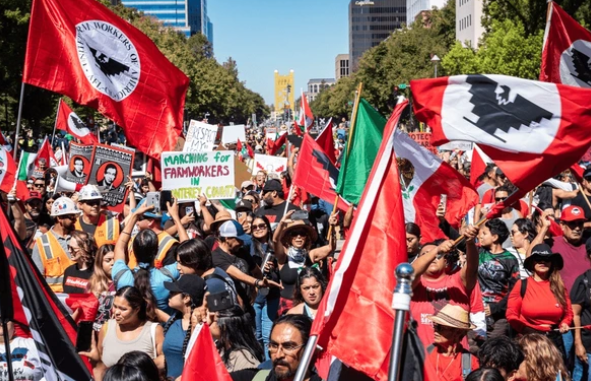Introduction to the United Farm Workers Movement
The United Farm Workers Movement is a significant chapter in the history of American labor rights. Led by iconic figures such as Cesar Chavez and Dolores Huerta, the movement sought to improve the working conditions and wages of farm workers, who were often subjected to harsh and exploitative conditions. The struggle for fair treatment in the agricultural sector galvanized a nationwide effort that brought about substantial changes in labor laws and union organizing.
Understanding the United Farm Workers (UFW) Movement provides insight into the broader context of labor activism and the fight for social justice. The movement’s success in advocating for the rights of agricultural workers highlights the power of collective action and the importance of union organizing in achieving meaningful change.
History of the United Farm Workers Movement
The history of the United Farm Workers Movement dates back to the 1960s, a period marked by civil rights activism and social change. The movement began as a response to the deplorable conditions faced by farm workers, including low wages, lack of basic amenities, and exposure to dangerous pesticides. The formation of the UFW brought together a coalition of labor activists, religious leaders, and community organizers dedicated to improving the lives of agricultural workers.
The Role of Cesar Chavez
Cesar Chavez was a pivotal figure in the United Farm Workers Movement. Born into a migrant farm worker family, Chavez experienced firsthand the struggles of agricultural laborers. His leadership in organizing strikes and boycotts brought national attention to the plight of farm workers and helped secure significant victories for the movement.
The Contribution of Dolores Huerta
Dolores Huerta co-founded the United Farm Workers Union with Cesar Chavez. Her tireless advocacy and strategic negotiations played a crucial role in the movement’s successes. Huerta’s efforts in organizing farm workers and negotiating contracts with growers were instrumental in achieving better wages and working conditions for agricultural laborers.
Impact of Cesar Chavez on Farm Workers’ Rights
The impact of Cesar Chavez on farm workers’ rights cannot be overstated. His leadership and dedication to nonviolent activism were central to the movement’s achievements. Chavez organized numerous strikes, marches, and boycotts, most notably the Delano grape strike and the subsequent nationwide boycott of grapes, which pressured growers to negotiate with the UFW.
The Delano Grape Strike
The Delano grape strike, which began in 1965, was a seminal event in the United Farm Workers Movement. Chavez, along with Filipino labor leader Larry Itliong, led thousands of farm workers in a strike against grape growers in California’s Central Valley. The strike lasted more than five years and drew national support, leading to significant improvements in wages and working conditions.
The Nationwide Grape Boycott
The nationwide grape boycott was one of the most effective tools used by the United Farm Workers Movement. Chavez and the UFW called on consumers to stop buying grapes until growers agreed to improve labor conditions. The boycott gained widespread support, including endorsements from major labor unions and civil rights organizations, ultimately forcing growers to sign labor contracts with the UFW.
United Farm Workers Union Achievements
The United Farm Workers Union achievements are numerous and impactful. The UFW’s efforts led to significant gains in labor rights and protections for farm workers, setting precedents for future labor movements.
Collective Bargaining Rights
One of the major achievements of the UFW was securing collective bargaining rights for farm workers. This allowed workers to negotiate better wages, benefits, and working conditions collectively, rather than individually. The ability to engage in collective bargaining empowered farm workers and gave them a stronger voice in their workplaces.
Improved Labor Conditions
The UFW’s advocacy led to substantial improvements in labor conditions for farm workers. The union successfully campaigned for the reduction of pesticide exposure, better housing conditions, and access to clean drinking water and sanitary facilities. These improvements had a direct and positive impact on the health and well-being of farm workers and their families.
Dolores Huerta’s Role in the UFW Movement
The role of Dolores Huerta in the UFW Movement was integral to its success. As a co-founder and key organizer, Huerta’s contributions were pivotal in advancing the movement’s goals and securing labor rights for farm workers.
Negotiating Labor Contracts
Dolores Huerta was instrumental in negotiating labor contracts between the UFW and agricultural employers. Her expertise in labor law and her tenacity in bargaining sessions helped secure agreements that provided fair wages, benefits, and protections for farm workers. Huerta’s efforts ensured that the gains made by the movement were solidified through legally binding contracts.
Advocacy and Education
Huerta’s work extended beyond negotiations. She played a crucial role in educating farm workers about their rights and empowering them to advocate for themselves. Through community organizing and educational programs, Huerta helped build a strong, informed, and united labor force capable of sustaining the movement’s momentum.
United Farm Workers Movement Grape Boycott
The United Farm Workers Movement grape boycott was one of the most effective strategies employed by the UFW to achieve its goals. The boycott not only raised public awareness about the conditions faced by farm workers but also exerted economic pressure on growers to negotiate with the union.
Organizing the Boycott
The organization of the grape boycott involved extensive grassroots mobilization. UFW members and supporters spread the word through marches, rallies, and public speaking engagements. The boycott gained traction as consumers across the country joined the effort, refusing to buy grapes until growers agreed to the UFW’s demands.
Read Also : Roe v. Wade: The Landmark Supreme Court Decision on Abortion Rights (1973)
Nationwide Impact
The nationwide impact of the grape boycott was profound. It demonstrated the power of collective consumer action and solidarity with labor movements. The boycott’s success led to the signing of labor contracts that significantly improved wages and working conditions for grape pickers and set a precedent for other agricultural labor disputes.
How the United Farm Workers Movement Changed Labor Laws
The United Farm Workers Movement played a critical role in changing labor laws and improving protections for agricultural workers. The movement’s activism highlighted the need for comprehensive labor reforms and inspired legislative action at both state and federal levels.
Legislative Advocacy
The UFW engaged in extensive legislative advocacy to secure better labor protections for farm workers. The union lobbied for the passage of laws that addressed issues such as pesticide safety, workplace conditions, and collective bargaining rights. These efforts resulted in significant legislative victories that enhanced the legal framework for agricultural labor.
The Agricultural Labor Relations Act
One of the most significant legislative achievements influenced by the UFW was the passage of the Agricultural Labor Relations Act (ALRA) in California in 1975. The ALRA established the right of farm workers to unionize and engage in collective bargaining. It also created the Agricultural Labor Relations Board (ALRB) to oversee labor disputes and ensure fair labor practices in the agricultural sector.
Key Events in the United Farm Workers Movement
The key events in the United Farm Workers Movement provide a timeline of the significant milestones and achievements that shaped the movement. These events highlight the strategic actions and persistent efforts that led to the movement’s success.
The Founding of the National Farm Workers Association
In 1962, Cesar Chavez and Dolores Huerta founded the National Farm Workers Association (NFWA), which later became the United Farm Workers (UFW). The founding of the NFWA marked the beginning of a coordinated effort to organize farm workers and advocate for their rights.
The Delano Grape Strike
The Delano grape strike, which began in 1965, was a pivotal event in the movement. The strike united Mexican-American and Filipino-American farm workers in a common cause, drawing national attention to their plight and building solidarity among agricultural laborers.
The Signing of the First Union Contracts
In 1970, the UFW achieved a significant victory with the signing of the first union contracts with grape growers. These contracts secured better wages, benefits, and working conditions for farm workers, demonstrating the power of union organizing and collective bargaining.
United Farm Workers Movement and Migrant Labor
The United Farm Workers Movement had a profound impact on migrant labor, addressing the unique challenges faced by migrant farm workers and advocating for their rights and protections.
Improving Conditions for Migrant Workers
The UFW worked to improve conditions for migrant workers, who often faced additional hardships due to their transient lifestyle. The union’s efforts included advocating for better housing, access to education for migrant children, and protections against exploitation by labor contractors.
Advocacy for Immigration Reform
The UFW also played a role in advocating for immigration reform, recognizing the connection between labor rights and immigration policy. The union supported policies that provided pathways to legal status for undocumented farm workers, ensuring that they could work without fear of deportation and access the same labor protections as other workers.
Challenges Faced by the United Farm Workers Union
The challenges faced by the United Farm Workers Union were numerous and formidable. Despite significant achievements, the UFW encountered obstacles that tested the movement’s resilience and determination.
Opposition from Growers
One of the primary challenges faced by the UFW was opposition from agricultural growers. Many growers resisted unionization efforts and employed various tactics to undermine the union, including hiring strikebreakers, using legal maneuvers to delay negotiations, and exerting political pressure to weaken labor laws.
Internal Struggles
The UFW also faced internal struggles, including debates over strategy, leadership conflicts, and financial difficulties. These challenges required the union to continually adapt and reassess its approach to organizing and advocacy.
Changing Political Climate
The changing political climate in the United States presented additional challenges for the UFW. Shifts in political power and policies influenced the union’s ability to secure and maintain labor rights and protections for farm workers.
Successes of the United Farm Workers Movement in California
The successes of the United Farm Workers Movement in California are a testament to the movement’s impact and effectiveness. The UFW achieved significant victories that improved the lives of farm workers and set an example for labor movements nationwide.
Legislative Achievements
In addition to the Agricultural Labor Relations Act, the UFW’s advocacy contributed to the passage of other important labor laws in California. These included regulations on pesticide use, protections for farm worker housing, and the establishment of health and safety standards for agricultural labor.
Long-Term Improvements
The long-term improvements achieved by the UFW are evident in the better wages, working conditions, and benefits secured for farm workers. The union’s efforts have had a lasting impact, providing a foundation for ongoing labor activism and advocacy in the agricultural sector.
United Farm Workers Movement and Collective Bargaining Rights
The United Farm Workers Movement was instrumental in securing collective bargaining rights for farm workers, a critical component of labor rights and protections.
The Importance of Collective Bargaining
Collective bargaining allows workers to negotiate as a group with their employers, providing a more balanced and equitable process for determining wages, benefits, and working conditions. The UFW’s success in securing collective bargaining rights empowered farm workers and gave them a stronger voice in their workplaces.
Legal Recognition of Collective Bargaining
The legal recognition of collective bargaining rights for farm workers was a major achievement of the UFW. The union’s efforts led to the establishment of frameworks and institutions, such as the Agricultural Labor Relations Board, to oversee and enforce collective bargaining agreements and ensure fair labor practices in the agricultural sector.
Influence of the United Farm Workers Movement on Modern Labor Rights
The influence of the United Farm Workers Movement on modern labor rights extends beyond the agricultural sector. The movement’s achievements and strategies have informed and inspired labor activism and advocacy across various industries.
Legacy of Nonviolent Activism
The UFW’s commitment to nonviolent activism, exemplified by Cesar Chavez and Dolores Huerta, has left a lasting legacy. The movement’s emphasis on peaceful protest, grassroots organizing, and coalition-building continues to serve as a model for labor and social justice movements.
Broader Impact on Labor Laws
The successes of the UFW have contributed to broader improvements in labor laws and protections. The movement’s achievements in securing better wages, working conditions, and collective bargaining rights have set precedents that benefit workers in other industries and sectors.
Legacy of the United Farm Workers Movement
The legacy of the United Farm Workers Movement is profound and enduring. The movement’s impact on labor rights, social justice, and advocacy continues to resonate today.
Read Also : American Revolutionary War: The Crucial Battles of Lexington and Concord (1775)
Lasting Contributions to Labor Rights
The UFW’s contributions to labor rights are lasting and significant. The movement’s successes in securing better wages, working conditions, and legal protections have improved the lives of countless farm workers and set standards for labor rights nationwide.
Inspiration for Future Generations
The United Farm Workers Movement serves as an inspiration for future generations of labor activists and social justice advocates. The movement’s commitment to nonviolent activism, community organizing, and collective action provides valuable lessons and strategies for those continuing the fight for fair and just labor practices.
Farm Worker Conditions Before the United Farm Workers Movement
The conditions faced by farm workers before the United Farm Workers Movement were harsh and exploitative. Understanding these conditions highlights the necessity and impact of the movement.
Poor Working Conditions
Farm workers before the UFW movement often worked in grueling conditions with little to no protections. Long hours, low wages, and exposure to hazardous pesticides were common. Workers lacked access to basic amenities such as clean drinking water, sanitary facilities, and adequate housing.
Lack of Legal Protections
Before the movement, farm workers were excluded from many of the labor protections enjoyed by other workers, including the right to unionize and engage in collective bargaining. This lack of legal protections left them vulnerable to exploitation and abuse by employers.
Role of Union Organizing in the United Farm Workers Movement
The role of union organizing in the United Farm Workers Movement was crucial to its success. Organizing efforts helped build a unified and empowered labor force capable of advocating for better conditions and rights.
Grassroots Organizing
The UFW’s grassroots organizing efforts were essential in mobilizing farm workers and building support for the movement. Organizers worked tirelessly to educate workers about their rights, encourage participation in strikes and boycotts, and foster a sense of solidarity and community.
Building Alliances
Union organizing also involved building alliances with other labor unions, civil rights organizations, religious groups, and community activists. These alliances provided vital support and resources, helping to amplify the movement’s message and extend its reach.
Conclusion
The United Farm Workers Movement was a transformative force in the fight for agricultural labor rights. Led by visionary leaders like Cesar Chavez and Dolores Huerta, the movement achieved significant victories that improved the lives of farm workers and set lasting precedents for labor rights and social justice. The movement’s legacy continues to inspire and inform labor activism, demonstrating the power of collective action and the importance of advocating for fair and just working conditions.
Frequently Asked Questions (FAQ)
What was the significance of the United Farm Workers Movement?
The United Farm Workers Movement was significant because it fought for and achieved better wages, working conditions, and legal protections for farm workers. The movement’s successes set important precedents for labor rights and inspired future labor activism.
Who were the key figures in the United Farm Workers Movement?
Key figures in the United Farm Workers Movement included Cesar Chavez and Dolores Huerta, who co-founded the United Farm Workers Union and played crucial roles in organizing and advocating for farm workers’ rights.
What were the main achievements of the United Farm Workers Union?
The main achievements of the United Farm Workers Union included securing collective bargaining rights, improving labor conditions, and influencing labor laws through legislative advocacy and successful strikes and boycotts.
How did the grape boycott impact the United Farm Workers Movement?
The grape boycott was a highly effective strategy that raised public awareness and applied economic pressure on growers to negotiate with the UFW. The success of the boycott led to significant labor contracts that improved wages and working conditions for farm workers.
What challenges did the United Farm Workers Union face?
The United Farm Workers Union faced challenges such as opposition from growers, internal struggles, and changing political climates. Despite these obstacles, the union achieved significant victories and maintained its commitment to improving farm workers’ lives.
How has the United Farm Workers Movement influenced modern labor rights?
The United Farm Workers Movement has influenced modern labor rights by setting precedents for collective bargaining, improving labor conditions, and advocating for comprehensive labor reforms. The movement’s strategies and achievements continue to inspire labor activism across various sectors.
What was the Agricultural Labor Relations Act?
The Agricultural Labor Relations Act (ALRA) was a significant legislative achievement influenced by the UFW. Passed in California in 1975, the ALRA established the right of farm workers to unionize and engage in collective bargaining and created the Agricultural Labor Relations Board to oversee labor disputes.







Together with almost everything that seems to be developing inside this area, your opinions are actually fairly refreshing. Nevertheless, I beg your pardon, because I can not subscribe to your entire theory, all be it radical none the less. It seems to me that your comments are generally not completely rationalized and in actuality you are your self not really fully convinced of your argument. In any event I did appreciate reading it.